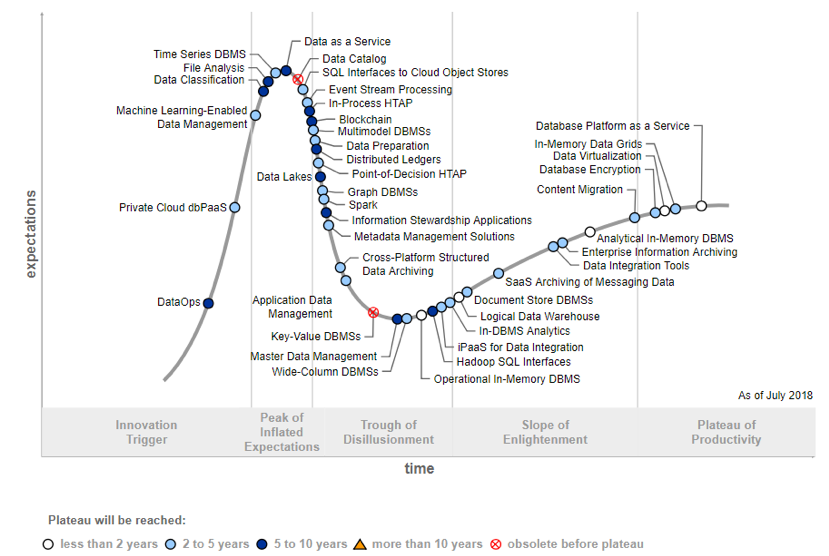
This year the Gartner Data and Analytics Summit goes virtual with a strong focus on how businesses create agility and value. That means we won’t get to cross paths on the show floor or start up a conversation after a compelling session or a keynote. But we will all have the opportunity to watch at our convenience, get inspired by the great content, and reach out to like-minded professionals to accelerate our journey. I’d like to share a few sessions I’m excited about.
#1: DataOps Is Here
So what is the biggest difference this year (aside from the virtual form factor)? The inclusion of the DataOps category as a conference track. DataOps is a set of practices and technologies that operationalize data management and integration to ensure resiliency and agility in the face of constant change.
Gartner first acknowledged the emerging practice of DataOps in their Hype Cycle for Data Management 2018. Since then, DataOps has gained momentum as more enterprises began to formalize the practices and procedures for DataOps. Gartner’s placement of Dataops as a key focus area shows further dedication to understanding its place in the modern data ecosystem.

Just as the practice of DevOps isn’t owned by a single vendor, a DataOps practice requires engagement across a range of functions, including data engineering, data management, data security and governance. Don’t miss our demo showing how to enable DataOps using smart data pipelines.
Product Demo by StreamSets: Modern Data Integration for DataOps
Data driven enterprises are rapidly moving to the cloud. DataOps is the methodology that will give them the freedom, security and scale they need to deliver continuous data to their data platforms, on-premises or in the cloud. Key to reliably operating in the cloud are smart data pipelines. Smart Data Pipelines are portable, resilient, and infinitely extendable. In this demo we will see how smart data pipelines help companies stay agile in the face of change.
Greg Fields, VP, Global Presales, StreamSets
#2: Ops Is Everywhere
The DataOps practice is part of a larger shift in the industry defined by Gartner as XOps. XOps is applying an agile operational model to all things data, machine learning, and development. XOps is a far departure from the norm, so how should enterprises plan to implement XOps?
XOps for Building Scalable AI Platforms
As AI and ML initiatives mature enterprises are at a loss to systematically productionalize their ML pipelines and face significant scalability and operational challenges. ML architectures tend to be constrained by data gravity, compute requirements and model integration complexities. Within this session, we will touch upon the framework to build and deploy ML models in production.
Sumit Agarwal, Senior Director, Gartner
#3 Cloud Data Lakes and Cloud Data Warehouses Are the Go-to Data Platforms
Cloud has become the norm instead of the exception. The conversation has shifted from, “should I use cloud in my data strategy” to “how do I build for and leverage cloud services?” The two data platforms that dominate public cloud usage for analytics are Cloud Data Lakes and Cloud Data Warehouses. Each comes with important design considerations and matching your analytics goals with your platform capabilities will be key in scoping these projects. Gartner offers up some advice here in these sessions on Cloud Data Lakes and Cloud Data Warehouses.
Cloud is the Future of Data Infrastructure
The database management market is undergoing a rapid transition. Cloud and dbPaaS have become the platform of choice and pricing models are under pressure from both the open-source and the cloud. – What is driving the data infrastructure transformation to new technologies? – How are existing technologies changing and what new technologies are emerging to support this transformation? – How are vendors addressing the shift to the cloud and how will the market evolve?
Donald Feinberg, VP & Distinguished Analyst, Gartner, Inc.
and
Data Lakes, Data Warehouses and Data Hubs Aren’t the Same: Know Their Capabilities and Purpose
Confusion persists regarding the role of data warehouses, data lakes and data hubs. They are NOT the same. While the names and terminology are less important than the principles and capabilities, data and analytics leaders need to know the capabilities and the value they provide. • What are data warehouses, data lakes and data hubs? • What are the key differences between these concepts? • How can they be used in combination to meet modern data and analytics needs?
Robert Thanaraj, Senior Principal Analyst, Gartner
See You at Gartner Summit
As more business decisions are made using data, ensuring you have a sound strategy and the flexibility to adapt that strategy becomes increasingly important. Leading analyst firm Gartner has assembled a terrific set of speakers and sessions on the theme: “Develop a resilient data and analytics strategy for an AI-ready, data-centric organization.”
Register now to plan your day of sessions, exhibitor booths, and the chance to schedule 1×1 meetings with the luminaries and vendors to help you develop your strategy.